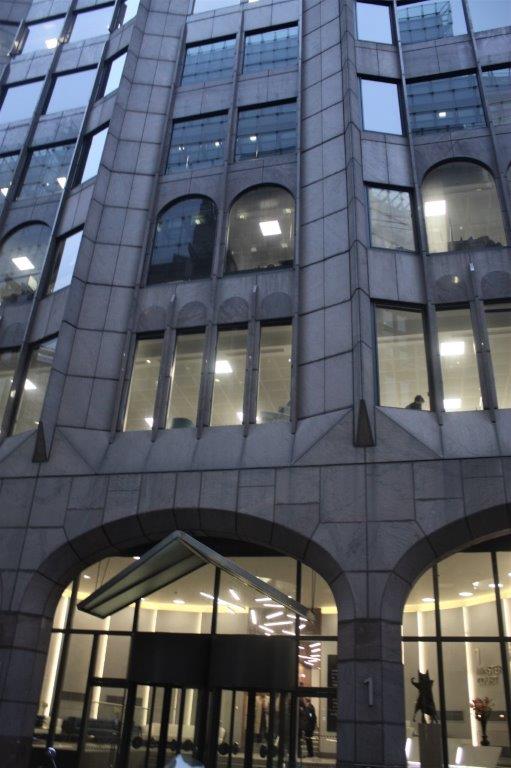IUMI confronts trade ‘chaos’ as it strives to protect insured clients
By James Brewer
London’s marine insurance market is going through one of its toughest periods in recent years, the president of the International Union of Marine Insurance has warned.
The twin pillars of underwriting in the City, Lloyd’s and the company sector, saw the exit of 11 facilities or parts of businesses with marine capacity during 2018, as weak premium rating, market overcapacity 2017 hurricane-related claims and Brexit uncertainties hurt the bottom line.
Speaking after the IUMI winter 2019 meeting in London, IUMI president Richard Turner began his review of current concerns by drawing attention to the pressures on London and other global markets.
A rigorous examination by management at Lloyd’s of syndicate business plans in 2018 led to a thinning of the marine hull and cargo market, where some participants have struggled with years of losses.
A series of announcements and reports of scaling-back decisions involved Aspen, Brit, AmTrust, CNA Hardy, Tokio Marine, Kiln, Barbican, Advent, MS Amlin, Acapella and WR Berkley.
SCOR-controlled Channel syndicate 2015 reduced its total capacity and moved hull and cargo business and other lines to the French group’s new London platform. Standard Club put its syndicate 1884 (established as recently as 2015) into run-off from January 2019.
All these developments throw into question the continuing ability of Lloyd’s, the biggest hull market worldwide, to go on writing as much as 17% of global premium in the speciality.
Lloyd’s had let it be known early in 2018 that it would reject the business plans of “consistently loss-making syndicates” unless they indicated a clear strategy for long-term profitability.
Sean Dalton of Munich Re America, who chairs the IUMI cargo committee, added that based on IUMI global cargo premium results, “this line of business is unprofitable on a worldwide basis and premiums are not risk-adequate to cover losses and expenses.”
IUMI is addressing squarely the geopolitical turmoil that is cramping trade and its members’ attempts to provide maximum coverage for clients. Mr Turner announced that the theme at the September 2019 IUMI annual conference, in Toronto, would be Confronting the chaos – for a sustainable future. This theme provided a framework for insurers to work out how to adapt to a changing landscape, including what they would be able to offer to clients amid ongoing macro-problems such as the US-China trade war and the expected exit of the UK from the European Union.
IUMI represents 42 national and marine market insurance and reinsurance associations.
“Our role in insurance is to underpin trade, and we are seeing protectionism emerging,” said the IUMI chief.
Mr Turner said that many insurers had made changes to take into account the UK’s departure from the trading bloc. As an example, he cited 11 insurers moving their base from London to Luxembourg and “I suspect there are one or two still to come.” Such businesses were facing an increase in administration and frictional costs.
(Mr Turner is a personal example of how companies are dealing with the Brexit predicament. A London market marine stalwart for many years, he has moved his home to Luxembourg, where his company RSA Insurance Group in September 2018 opened an office as part of its preparations for Brexit. The company said that the office will “provide a platform for RSA in Europe post-Brexit, minimising disruption to RSA’s business with EU-based customers and ensuring the business continues to serve UK customers’ needs in Europe. Mr Turner who previously oversaw RSA’s EU business from the UK, is now director for RSA Luxembourg).
Mr Dalton underlined the hazards of fires on containerships, adding that “the size of the vessels is adding a great deal of complexity.” He said that major casualties included the 15,162 teu containership Maersk Honam in March 2018 when five crew members lost their lives and more than a month was need to extinguish a blaze in the ship, which was on voyage from Singapore to Suez. The ship is set to be the centre of the largest general average settlement in history.
Some fires, said IUMI, were caused by mis-declared cargo and improperly shipped hazardous material. “Carrier alliances are adding more complexity to the growing concern, as one shipping line will be carrying another’s containers and replying on their performance to vet and screen cargo.”
Calling for greater transparency of information, Mr Dalton said that “unknown accumulation” was a further challenge: “The largest containerships will carry cargo values in excess of $1bn but often the insurer or reinsurer is not able to attribute specific exposure to their clients.”
Meanwhile, in the light of the introduction of low sulphur fuel under the 2020 environmental policy of the International Maritime Organization, IUMI is calling for refineries to be forced to guarantee the quality of their fuel. Currently, fuel testing is undertaken by the end-user. IUMI is anxious too for vessel operators to enhance their systems, processes and training.
Helle Hammer, chair of the IUMI policy forum, said that incidents of fuel contamination were growing. This scourge affects machine performance and can lead to engine damage or failure, and possibly collision and environmental impact.
IUMI said in a statement on the 2020 introduction of the sulphur cap: “Since governments oblige ship operators to burn certain grades of fuel, IUMI believes refineries should be compelled to conduct testing and confirm the delivery of non-contaminated fuel.
“If action is not taken to ensure reduced contamination, IUMI is concerned that the shipping industry will be faced with additional expense which insurance will not automatically cover.” The potential for a very costly claim “is there,” added Ms Hammer, who is managing director of the Norwegian marine insurance association Cefor.
The problem arises because supply of low sulphur fuel is not consistent around the world, differing by vendor and port of delivery. Fuel can contain a high level of catalytic fines which systems on board and processes often fail to filter out. Differences in flashpoint and combustibility were another concern.
Burning low sulphur fuels brought the added risk of speed loss and the requirement for additional tank cleaning.
Ms Hammer alongside IUMI secretary general Lars Lange and policy director Hendrike Kühl have been intensifying the organisation’s lobbying of IMO on industry issues.
Don Harrell, chair of the IUMI facts and figures committee, said that IUMI’s large claims database for hull and cargo had moved to a “live annual workstream” following a successful pilot trial. Insurance associations from Belgium, Germany, Japan, the Netherlands, Sweden and Singapore were reporting claims exceeding $250,000 or $500,000, and Italy and France had just joined the reporting network, with the International Underwriting Association expected to join later in 2019.
A new brochure, to be published annually, will detail key shipping statistics. Mr Harrell, of Aspen Insurance, said that based on figures from Clarkson, the global ocean-going fleet was 61% bigger in tonnage terms than it was in 2008 [year of the financial meltdown]. Fleet growth in 2018 at 3% was the highest in 18 years. Ship demolition had slowed to its lowest level since 2010.









